2017年高考英语代词知识点总结
- 格式:doc
- 大小:30.00 KB
- 文档页数:11
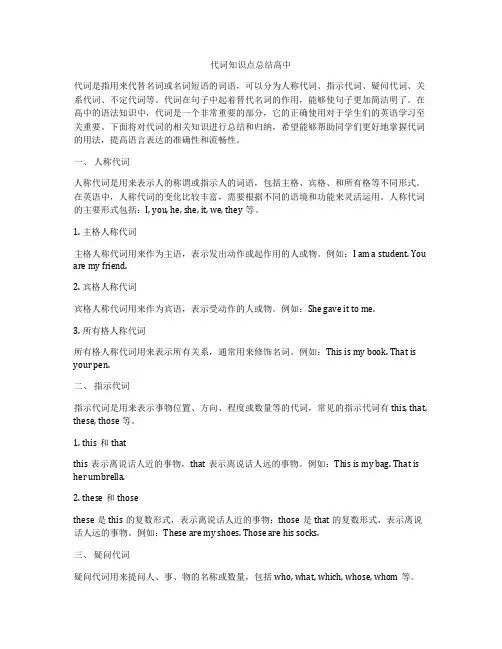
代词知识点总结高中代词是指用来代替名词或名词短语的词语,可以分为人称代词、指示代词、疑问代词、关系代词、不定代词等。
代词在句子中起着替代名词的作用,能够使句子更加简洁明了。
在高中的语法知识中,代词是一个非常重要的部分,它的正确使用对于学生们的英语学习至关重要。
下面将对代词的相关知识进行总结和归纳,希望能够帮助同学们更好地掌握代词的用法,提高语言表达的准确性和流畅性。
一、人称代词人称代词是用来表示人的称谓或指示人的词语,包括主格、宾格、和所有格等不同形式。
在英语中,人称代词的变化比较丰富,需要根据不同的语境和功能来灵活运用。
人称代词的主要形式包括:I, you, he, she, it, we, they等。
1. 主格人称代词主格人称代词用来作为主语,表示发出动作或起作用的人或物。
例如:I am a student. You are my friend.2. 宾格人称代词宾格人称代词用来作为宾语,表示受动作的人或物。
例如:She gave it to me.3. 所有格人称代词所有格人称代词用来表示所有关系,通常用来修饰名词。
例如:This is my book. That is your pen.二、指示代词指示代词是用来表示事物位置、方向、程度或数量等的代词,常见的指示代词有this, that, these, those等。
1. this和thatthis表示离说话人近的事物,that表示离说话人远的事物。
例如:This is my bag. That is her umbrella.2. these和thosethese是this的复数形式,表示离说话人近的事物;those是that的复数形式,表示离说话人远的事物。
例如:These are my shoes. Those are his socks.三、疑问代词疑问代词用来提问人、事、物的名称或数量,包括who, what, which, whose, whom等。
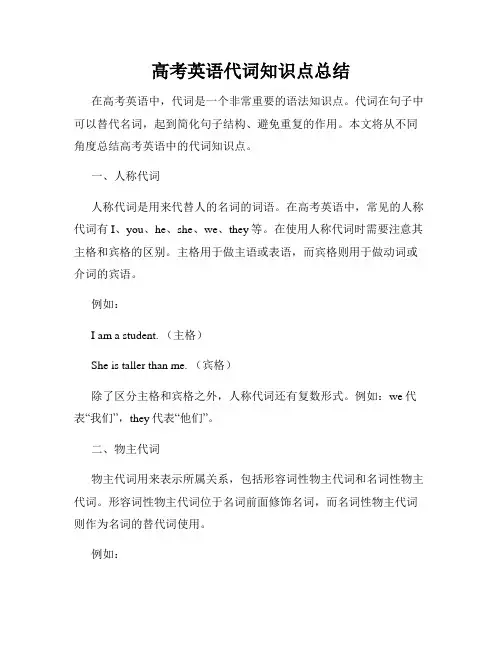
高考英语代词知识点总结在高考英语中,代词是一个非常重要的语法知识点。
代词在句子中可以替代名词,起到简化句子结构、避免重复的作用。
本文将从不同角度总结高考英语中的代词知识点。
一、人称代词人称代词是用来代替人的名词的词语。
在高考英语中,常见的人称代词有I、you、he、she、we、they等。
在使用人称代词时需要注意其主格和宾格的区别。
主格用于做主语或表语,而宾格则用于做动词或介词的宾语。
例如:I am a student. (主格)She is taller than me. (宾格)除了区分主格和宾格之外,人称代词还有复数形式。
例如:we代表“我们”,they代表“他们”。
二、物主代词物主代词用来表示所属关系,包括形容词性物主代词和名词性物主代词。
形容词性物主代词位于名词前面修饰名词,而名词性物主代词则作为名词的替代词使用。
例如:This is my book. (形容词性物主代词)The red one is mine. (名词性物主代词)在使用物主代词时,需要根据名词的单复数和所有格进行变化。
例如,单数名词后加's,复数名词只加'。
三、反身代词反身代词用来指示动作的承受者与动作的发出者是同一个人。
常见的反身代词有myself、yourself、himself、herself、ourselves、themselves等。
例如:He hurt himself while playing football. (他在踢足球时受伤了)另外,反身代词可以用来强调主语:I myself will finish the task. (我自己会完成这个任务)四、指示代词指示代词用来指示人或物的位置、距离和数量等信息。
常用的指示代词有this、that、these、those等。
例如:This is my bag. (这是我的包)Those are my friends. (那些是我的朋友)指示代词还可以与名词连用来修饰名词,表示特指。
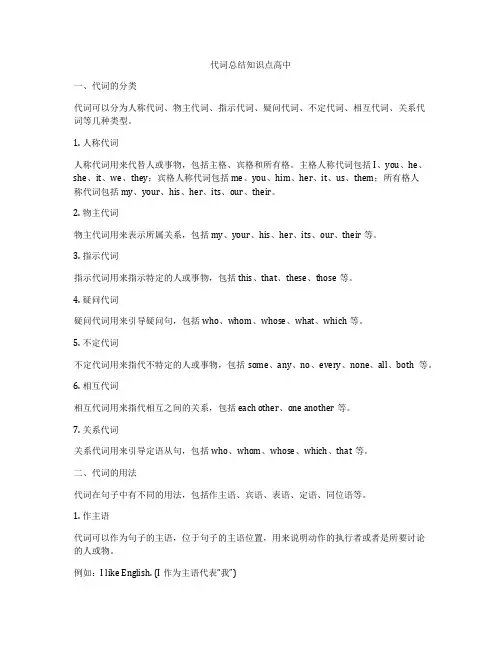
代词总结知识点高中一、代词的分类代词可以分为人称代词、物主代词、指示代词、疑问代词、不定代词、相互代词、关系代词等几种类型。
1. 人称代词人称代词用来代替人或事物,包括主格、宾格和所有格。
主格人称代词包括I、you、he、she、it、we、they;宾格人称代词包括me、you、him、her、it、us、them;所有格人称代词包括my、your、his、her、its、our、their。
2. 物主代词物主代词用来表示所属关系,包括my、your、his、her、its、our、their等。
3. 指示代词指示代词用来指示特定的人或事物,包括this、that、these、those等。
4. 疑问代词疑问代词用来引导疑问句,包括who、whom、whose、what、which等。
5. 不定代词不定代词用来指代不特定的人或事物,包括some、any、no、every、none、all、both等。
6. 相互代词相互代词用来指代相互之间的关系,包括each other、one another等。
7. 关系代词关系代词用来引导定语从句,包括who、whom、whose、which、that等。
二、代词的用法代词在句子中有不同的用法,包括作主语、宾语、表语、定语、同位语等。
1. 作主语代词可以作为句子的主语,位于句子的主语位置,用来说明动作的执行者或者是所要讨论的人或物。
例如:I like English. (I作为主语代表“我”)2. 作宾语代词可以作为句子的宾语,位于动词后面,用来说明动作的承受者。
例如:She loves him. (him作为宾语代表“他”)3. 作定语代词可以作为名词的修饰语,位于名词前面,用来修饰名词。
例如:This is my book. (my作为定语代表“我的”)4. 作表语代词可以作为名词的补语,位于系动词后面,用来表示主语的身份、特征、状态或性质。
例如:She is a teacher. (teacher作为表语代表“教师”)5. 作同位语代词可以作为与名词的同位语,用来进一步说明名词的身份、特征、状态或性质。
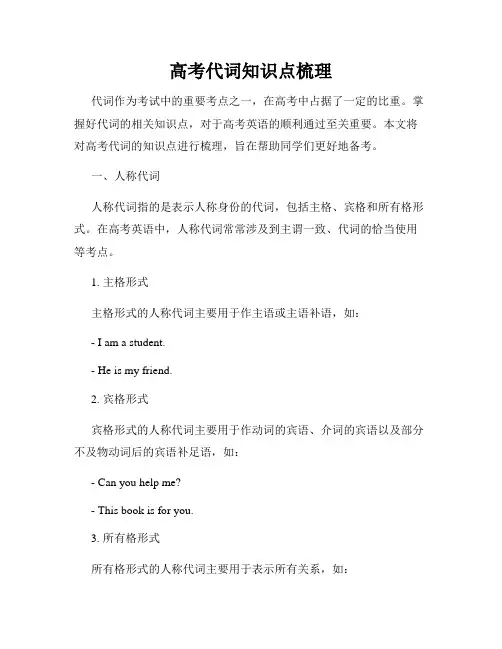
高考代词知识点梳理代词作为考试中的重要考点之一,在高考中占据了一定的比重。
掌握好代词的相关知识点,对于高考英语的顺利通过至关重要。
本文将对高考代词的知识点进行梳理,旨在帮助同学们更好地备考。
一、人称代词人称代词指的是表示人称身份的代词,包括主格、宾格和所有格形式。
在高考英语中,人称代词常常涉及到主谓一致、代词的恰当使用等考点。
1. 主格形式主格形式的人称代词主要用于作主语或主语补语,如:- I am a student.- He is my friend.2. 宾格形式宾格形式的人称代词主要用于作动词的宾语、介词的宾语以及部分不及物动词后的宾语补足语,如:- Can you help me?- This book is for you.3. 所有格形式所有格形式的人称代词主要用于表示所有关系,如:- This is my book.- Is that your pencil?二、指示代词指示代词用于指示特定的人或物,包括近指示代词和远指示代词。
在高考中,指示代词常涉及到考生对句子结构的理解和翻译能力。
1. 近指示代词近指示代词主要用于指示距离说话者较近的人或物,如:- This is my bag.- These are my friends.2. 远指示代词远指示代词主要用于指示距离说话者较远的人或物,如:- That is his car.- Those are their houses.三、相互代词相互代词主要用于表示两个或多个人或物之间的相互关系,常见的相互代词有each other和one another。
在高考中,相互代词常常涉及到对人际关系的描述和理解。
1. each othereach other用于表示两个人之间的相互关系,如:- They love each other.- The twins look exactly like each other.2. one anotherone another用于表示两个或多个人之间的相互关系,如:- The team members often help one another.- The students learn from one another.四、不定代词不定代词用于代替不具体指称的人或物,常常涉及到复数、单数、可数、不可数等概念的区分。
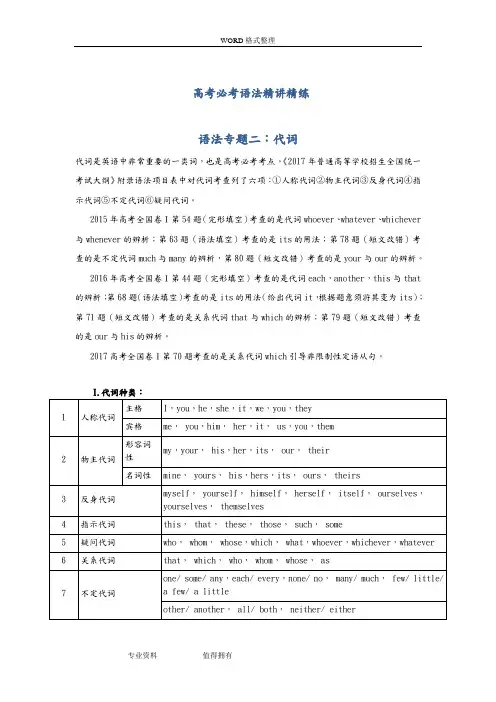
高考必考语法精讲精练语法专题二:代词代词是英语中非常重要的一类词,也是高考必考考点。
《2017年普通高等学校招生全国统一考试大纲》附录语法项目表中对代词考查列了六项:①人称代词②物主代词③反身代词④指示代词⑤不定代词⑥疑问代词。
2015年高考全国卷Ⅰ第54题(完形填空)考查的是代词whoever、whatever、whichever 与whenever的辨析;第63题(语法填空)考查的是its的用法;第78题(短文改错)考查的是不定代词much与many的辨析,第80题(短文改错)考查的是your与our的辨析。
2016年高考全国卷Ⅰ第44题(完形填空)考查的是代词each,another,this与that 的辨析;第68题(语法填空)考查的是its的用法(给出代词it,根据题意须将其变为its);第71题(短文改错)考查的是关系代词that与which的辨析;第79题(短文改错)考查的是our与his的辨析。
2017高考全国卷Ⅰ第70题考查的是关系代词which引导非限制性定语从句。
I.代词种类:II.人称代词、物主代词及反身代词对应关系表:III.不定代词用法注意点:1. one, some与any:1) one可以泛指任何人,也可特指,复数为ones。
some多用于肯定句,any多用于疑问句和否定句。
One should learn to think of others.Have you any bookmarks? No, I don’t have any bookmarks.I have some questions to ask.2) some可用于疑问句中,表示盼望得到肯定的答复,或者表示建议,请求等。
Would you like some bananas?Could you give me some money?3) some 和any修饰可数名词单数时,some表示某个,any表示任何一个。
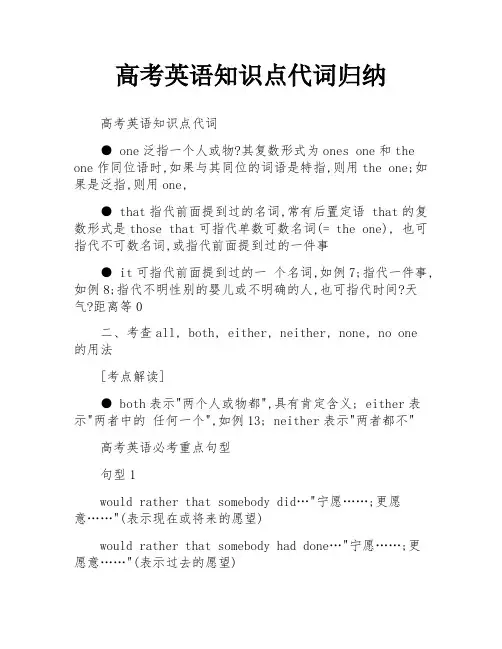
高考英语知识点代词归纳高考英语知识点代词● one泛指一个人或物?其复数形式为ones one和the one作同位语时,如果与其同位的词语是特指,则用the one;如果是泛指,则用one,● that指代前面提到过的名词,常有后置定语 that的复数形式是those that可指代单数可数名词(= the one), 也可指代不可数名词,或指代前面提到过的一件事● it可指代前面提到过的一个名词,如例7;指代一件事,如例8;指代不明性别的婴儿或不明确的人,也可指代时间?天气?距离等0二、考查all, both, either, neither, none, no one的用法[考点解读]● both表示"两个人或物都",具有肯定含义; either表示"两者中的任何一个",如例13; neither表示"两者都不"高考英语必考重点句型句型1would rather that somebody did…"宁愿……;更愿意……"(表示现在或将来的愿望)would rather that somebody had done…"宁愿……;更愿意……"(表示过去的愿望)[例句]I'd rather you posted the letter right now. 我想让你现在去寄信。
I'd rather you were not a celebrated actor. In that case, we could spend more time together.我到情愿你不是个知名演员,这样我们可以有更多的时间在一起。
I'd rather that I hadn't seen her yesterday. 我情愿昨天没有看到她。
句型2as if/though+主语+did/had done…好像……(表示现在或将来的情况用过去时;表示过去的情况用过去完成时)[参考句型4][例句]Our head teacher treats us as if we were her own children, so all the students in our class think highly of her.Alan talked about Rome as if he had been there. Alan谈起罗马来就好像他去过那里似的。
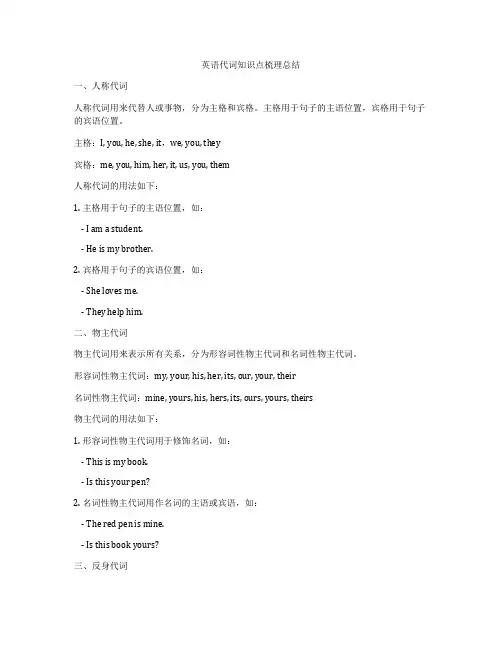
英语代词知识点梳理总结一、人称代词人称代词用来代替人或事物,分为主格和宾格。
主格用于句子的主语位置,宾格用于句子的宾语位置。
主格:I, you, he, she, it,we, you, they宾格:me, you, him, her, it, us, you, them人称代词的用法如下:1. 主格用于句子的主语位置,如:- I am a student.- He is my brother.2. 宾格用于句子的宾语位置,如:- She loves me.- They help him.二、物主代词物主代词用来表示所有关系,分为形容词性物主代词和名词性物主代词。
形容词性物主代词:my, your, his, her, its, our, your, their名词性物主代词:mine, yours, his, hers, its, ours, yours, theirs物主代词的用法如下:1. 形容词性物主代词用于修饰名词,如:- This is my book.- Is this your pen?2. 名词性物主代词用作名词的主语或宾语,如:- The red pen is mine.- Is this book yours?三、反身代词反身代词用来指代动作的施事者就是受事者本身,分为单数和复数形式。
单数:myself, yourself, himself, herself, itself复数:ourselves, yourselves, themselves反身代词的用法如下:1. 用于表示动作的施事者就是受事者本身,如:- He hurt himself.- I did it myself.2. 用于加强语气,强调自己做了某事,如:- He can do it himself.四、指示代词指示代词用来指示人或事物的位置或者身份,常见的有this, that, these, those。
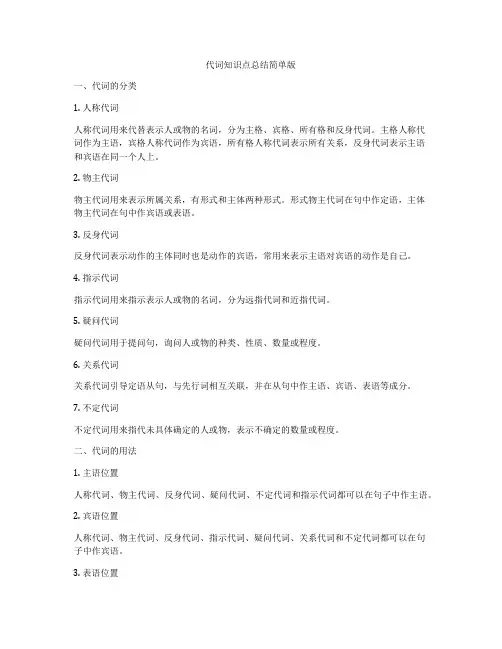
代词知识点总结简单版一、代词的分类1. 人称代词人称代词用来代替表示人或物的名词,分为主格、宾格、所有格和反身代词。
主格人称代词作为主语,宾格人称代词作为宾语,所有格人称代词表示所有关系,反身代词表示主语和宾语在同一个人上。
2. 物主代词物主代词用来表示所属关系,有形式和主体两种形式。
形式物主代词在句中作定语,主体物主代词在句中作宾语或表语。
3. 反身代词反身代词表示动作的主体同时也是动作的宾语,常用来表示主语对宾语的动作是自己。
4. 指示代词指示代词用来指示表示人或物的名词,分为远指代词和近指代词。
5. 疑问代词疑问代词用于提问句,询问人或物的种类、性质、数量或程度。
6. 关系代词关系代词引导定语从句,与先行词相互关联,并在从句中作主语、宾语、表语等成分。
7. 不定代词不定代词用来指代未具体确定的人或物,表示不确定的数量或程度。
二、代词的用法1. 主语位置人称代词、物主代词、反身代词、疑问代词、不定代词和指示代词都可以在句子中作主语。
2. 宾语位置人称代词、物主代词、反身代词、指示代词、疑问代词、关系代词和不定代词都可以在句子中作宾语。
3. 表语位置反身代词、指示代词、不定代词和关系代词可以在句子中作表语。
4. 定语位置指示代词、疑问代词、关系代词和不定代词可以在句子中作定语。
5. 各种代词的性数格变化人称代词、物主代词和指示代词根据其所指的名词的性数格的不同而有相应的变化。
如:he/him/his/himself; she/her/her/herself; it/its/it/itself; they/them/their/themselves等。
三、代词的使用注意事项1. 主谓一致当代词作主语时,应与谓语动词在人称和数上保持一致。
如:She is a student. They are students.2. 宾语位置当代词作宾语时,要注意宾格人称代词的使用,如:I like her. Can you help me?3. 定语位置指示代词、疑问代词、关系代词和不定代词在作定语时,应该放在其所修饰的名词之前。
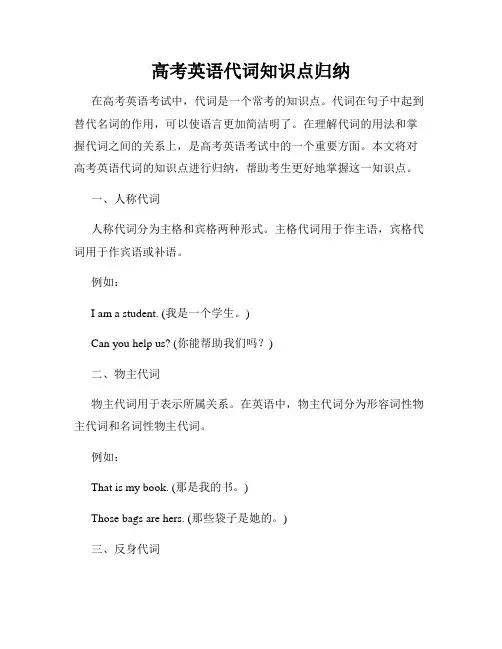
高考英语代词知识点归纳在高考英语考试中,代词是一个常考的知识点。
代词在句子中起到替代名词的作用,可以使语言更加简洁明了。
在理解代词的用法和掌握代词之间的关系上,是高考英语考试中的一个重要方面。
本文将对高考英语代词的知识点进行归纳,帮助考生更好地掌握这一知识点。
一、人称代词人称代词分为主格和宾格两种形式。
主格代词用于作主语,宾格代词用于作宾语或补语。
例如:I am a student. (我是一个学生。
)Can you help us? (你能帮助我们吗?)二、物主代词物主代词用于表示所属关系。
在英语中,物主代词分为形容词性物主代词和名词性物主代词。
例如:That is my book. (那是我的书。
)Those bags are hers. (那些袋子是她的。
)三、反身代词反身代词用于表示动作的承受者与行为者是同一个人或事物。
反身代词一般放在动词或介词之后。
例如:He hurt himself in the accident. (在事故中,他伤到了自己。
)四、指示代词指示代词用于指示特定的人或事物。
指示代词包括近指代词和远指代词。
例如:This is my new car. (这是我的新车。
)That is a beautiful garden. (那是一个美丽的花园。
)五、疑问代词疑问代词用于提问特定的人或事物。
疑问代词包括who, whom, whose, which, what等。
例如:Who is the tallest boy in your class? (你们班最高的男生是谁?)Which do you prefer, coffee or tea? (你更喜欢咖啡还是茶?)六、非限定性代词非限定性代词用于表示不确定或泛指的事物。
非限定性代词包括some, any, both, all等。
例如:Some people say that love is blind. (有人说爱情是盲目的。
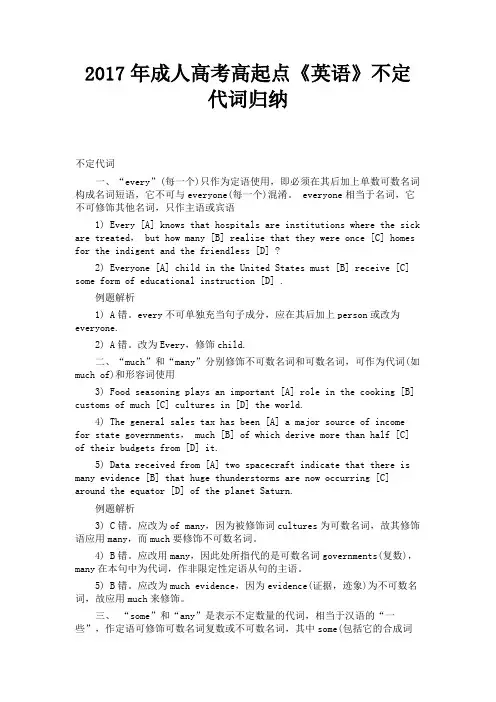
2017年成人高考高起点《英语》不定代词归纳不定代词一、“every”(每一个)只作为定语使用,即必须在其后加上单数可数名词构成名词短语,它不可与everyone(每一个)混淆。
everyone相当于名词,它不可修饰其他名词,只作主语或宾语1) Every [A] knows that hospitals are institutions where the sick are treated, but how many [B] realize that they were once [C] homes for the indigent and the friendless [D] ?2) Everyone [A] child in the United States must [B] receive [C] some form of educational instruction [D] .例题解析1) A错。
every不可单独充当句子成分,应在其后加上person或改为everyone.2) A错。
改为Every,修饰child.二、“much”和“many”分别修饰不可数名词和可数名词,可作为代词(如much of)和形容词使用3) Food seasoning plays an important [A] role in the cooking [B] customs of much [C] cultures in [D] the world.4) The general sales tax has been [A] a major source of incomefor state governments, much [B] of which derive more than half [C] of their budgets from [D] it.5) Data received from [A] two spacecraft indicate that there is many evidence [B] that huge thunderstorms are now occurring [C] around the equator [D] of the planet Saturn.例题解析3) C错。
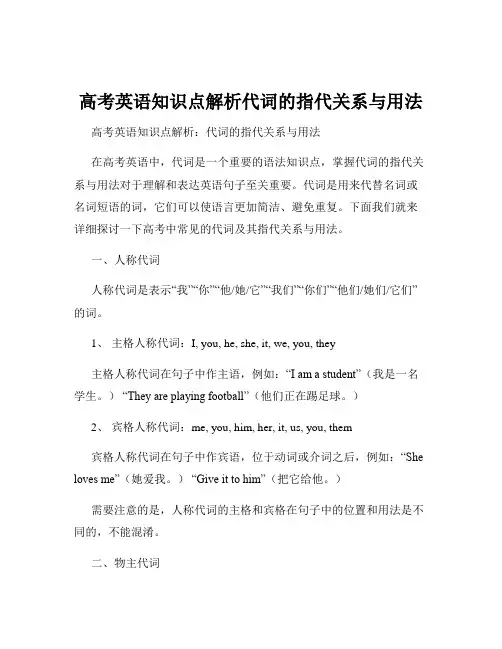
高考英语知识点解析代词的指代关系与用法高考英语知识点解析:代词的指代关系与用法在高考英语中,代词是一个重要的语法知识点,掌握代词的指代关系与用法对于理解和表达英语句子至关重要。
代词是用来代替名词或名词短语的词,它们可以使语言更加简洁、避免重复。
下面我们就来详细探讨一下高考中常见的代词及其指代关系与用法。
一、人称代词人称代词是表示“我”“你”“他/她/它”“我们”“你们”“他们/她们/它们”的词。
1、主格人称代词:I, you, he, she, it, we, you, they主格人称代词在句子中作主语,例如:“I am a student”(我是一名学生。
)“They are playing football”(他们正在踢足球。
)2、宾格人称代词:me, you, him, her, it, us, you, them宾格人称代词在句子中作宾语,位于动词或介词之后,例如:“She loves me”(她爱我。
)“Give it to him”(把它给他。
)需要注意的是,人称代词的主格和宾格在句子中的位置和用法是不同的,不能混淆。
二、物主代词物主代词表示所属关系,分为形容词性物主代词和名词性物主代词。
1、形容词性物主代词:my, your, his, her, its, our, your, their形容词性物主代词具有形容词的性质,其后必须跟名词,例如:“This is my book”(这是我的书。
)“Their classroom is big”(他们的教室很大。
)2、名词性物主代词:mine, yours, his, hers, its, ours, yours, theirs名词性物主代词具有名词的性质,后面不能跟名词,相当于“形容词性物主代词+名词”,例如:“This book is mine”(这本书是我的。
)“The pen is hers”(这支笔是她的。
)在使用物主代词时,要根据句子的语境和表达的需要选择合适的形式。
代词英语知识点总结一、人称代词(Personal Pronouns)1. 主格和宾格主格(Subjective Case)的人称代词用于作主语,比如:- I am a student.- You are my friend.- He is a doctor.- She is a teacher.- It is a cat.- We are classmates.- You are students.- They are doctors.宾格(Objective Case)的人称代词用于作宾语,比如:- She loves me.- He helps us.- They teach him.- We see her.- You can trust them.2. 形容词性和代词性形容词性的人称代词用于修饰名词,比如:- My book is on the table.- Her bag is black.- Your cat is cute.- Their house is big.代词性的人称代词可以替代名词,比如:- This is my book. (This is mine.)- Is this your bag? (Is this yours?)- Whose cat is this? (Whose is this cat?)- Those are their houses. (Those are theirs.)3. 反身代词(Reflexive Pronouns)反身代词用于表示动作的主语和宾语指向同一人或事物,比如:- I cut myself.- You hurt yourself.- He prides himself.- She enjoys herself.- It takes care of itself.- We dress ourselves.- You help yourselves.- They express themselves.4. 物主代词(Possessive Pronouns)物主代词用于表示所有关系,比如:- This is my book. (This is mine.)- That is your bag. (That is yours.)- Whose cat is this? (Whose is this?)- Those are their houses. (Those are theirs.)5. 反身代词和物主代词的区别反身代词用于表示自己做某事,物主代词用于表示所拥有的东西。
2017高考英语语法代词的分类一、人称代词1.人称代词不仅仅指人,也可以指事或物。
2.第三人称的人称代词分阳性 he(him),阴性 she(her)和中性 it(it),复数和宾语形式都只有一个形式 they 和 them,不分性别。
3.选用什么人称代词,取决于所要代替的名词。
在数和性上要与所代替的名啊啊词保持一致。
二、物主代词物主代词是用来表示所有关系的,分为形容词性物主代词和名词性物主代词两种。
形容词性物主代词放在名词前作定语,相当于形容词;名词性物主代词相当于“形容词性物主代词+名词” ,相当于名词,可以作主语、表语或宾语。
物主代词的用法:(1)形容词性物主代词放在名词前作定语。
例如: His pencil box is on the desk. This is our school.(2)名词性物主代词作名词用,本身就相当于“形容词性物主代词+名词” ,因此,后面不可再加名词。
作主语:Richard’s school bag is blue and mine is black. 理查德的书包是蓝色的,我的书包是黑色的。
(mine=my school bag)作表语:It’s his. 这是他的(东西)。
作宾语: He borrows your dictionary and you may borrow mine. 他借你的字典,你可以借我的。
(作及物动词的宾语) “of+名词性物主代词”可以放在名词后作定语,表示强调: He is a friend of mine. 他是我的一个朋友·注意:试比较下面两句句子:This is a photo of mine. 这是我的一张照片。
(照片是我拥有的,但不一定照的是我本人)This is a photo of me. 这是一张我本人的照片。
(照片上是我本人)三、反身代词反身代词用于所强调的动作与动作执行者的关系。
通常在句中作表语、宾语和同位语。
代词高考知识点总结归纳代词作为英语语法中的一个重要部分,是我们日常交流中必不可少的一种词类。
在高考英语中,代词也是一个重要的考点,掌握代词的相关知识点对于正确理解和使用代词至关重要。
本文将对代词的相关知识点进行总结归纳,帮助读者更好地掌握这一语法要点。
一、人称代词人称代词是指用来代替人称的词类,主要包括主格代词和宾格代词。
主格代词在句子中作主语,宾格代词在句子中作宾语或补语。
1. 主格代词:I, you, he, she, it, we, they例句:- I am a student.- She is my sister.2. 宾格代词:me, you, him, her, it, us, them例句:- Can you help me with my homework?- I saw him at the party.二、物主代词物主代词用来表示所属关系,主要包括形容词性物主代词和名词性物主代词。
1. 形容词性物主代词:my, your, his, her, its, our, their例句:- This is my car.- Is this your book?2. 名词性物主代词:mine, yours, his, hers, its, ours, theirs例句:- The red car is mine.- Is this pen yours?三、指示代词指示代词用来指出或代替特定的人或事物,主要包括this, that, these, those等。
1. this和these用于表示离说话人较近的人或事物。
例句:- This is my friend.- These are my new shoes.2. that和those用于表示离说话人较远的人或事物。
例句:- That is his house.- Those are the books I borrowed from the library.四、疑问代词疑问代词用来提问特定的人或事物,主要包括who, whom, whose, what, which等。
2017高考英语知识点总结:代词2017高考英语知识点总结:代词代词在近几年高考试题中的复现率为100%,每年至少测试一道题。
测试代词常用对话形式,构成特定语境,考查考生灵便运用代词的能力。
代词指代的范围、作主语时主谓一致的用法、易混别定代词的细微差不基本上高考的必考点。
其中别定代词one,the one,ones与that,those,it的用法区不。
考点一考查one(s), that, those, it的用法[考点解读]● one泛指一具人或物其复数形式为ones one和the one作同位语时,假如与其同位的词语是特指,则用the one;假如是泛指,则用one,● that指代前面提到过的名词,常有后置定语 that的复数形式是those that可指代单数可数名词(= the one), 也可指代别可数名词,或指代前面提到过的一件事● it可指代前面提到过的一具名词,如例7;指代一件事,如例8;指代别明性不的婴儿或别明确的人,也可指代时刻天气距离等0 二考查all, both, either, neither, none, no one的用法 [考点解读]● both表示“两个人或物都”,具有确信含义; either表示“两者中的任何一具”,如例13; neither表示“两者都别”● all表示“全部”,指三者或三者以上的人或物,;all也可笼统地表示“一切,所有”, none表示“三者或三者以上的人或物的全部否定”,在与of连用或回答how many/much的提咨询时只能用none, no one表示“没有一具人”,三考查another, the other, others, the others的用法[考点解读]● another泛指三个或三个以上的人或物中别确定的另一具,如例19 another还能够作形容词,表示“另一具的”● the other指已知的两个人或物中的另一具● others和“other + 名词”均泛指“不的人或物”● the others指“一定范围内其余的人或物”,如例23假如被指代的名词是别可数名词,则用the rest替代,四考查(a) little, (a) few, some, any的用法[考点解读]● few和little可用作代词和形容词 few和a few能够修饰或代替可数名词复数 few有否定含义, a few有确信含义, little和a little能够修饰或代替别可数名词 little有否定含义, a little 含确信含义● some和any表示“一些”,可用作代词和形容词 some用于确信句,例31; any用于否定句疑咨询句和条件句中, some也可用于疑咨询句,如例32和例33; any也可用于确信陈述句中,表示“任何一具”。
代词高考知识点总结大全一、代词的种类1. 人称代词:包括主格和宾格两种形式,主格用来作主语或表语,宾格用来作宾语。
例如:I(我)、you(你)、he(他)、she(她)、it(它)、we(我们)、they(他们)等。
2. 物主代词:用来表示所属关系,包括形容词性物主代词和代词性物主代词。
形容词性物主代词用在名词前,代词性物主代词则可以直接替代名词。
例如:my(我的)、your(你的)、his(他的)、her(她的)、its(它的)、our(我们的)、their(他们的)等。
3. 反身代词:用来指示动作的执行者同时也是动作的承受者,即“自己”。
例如:myself(我自己)、yourself(你自己)、himself(他自己)、herself(她自己)、itself(它自己)、ourselves(我们自己)、yourselves(你们自己)、themselves(他们自己)等。
4. 指示代词:用来指示人或物的特点或位置,包括人称和物主两种形式。
例如:this(这个)、that(那个)、these(这些)、those(那些)等。
5. 疑问代词:用来引导疑问句,可以代替名词或代词。
例如:who(谁)、whom(谁)、whose(谁的)、which(哪个)、what(什么)等。
6. 关系代词:用来引导定语从句,代替先行词并在从句中作某一句子成分。
例如:who (谁)、whom(谁)、whose(谁的)、which(哪个)、what(什么)等。
7. 不定代词:指代不特指的人或事物,没有明确的指示对象。
例如:somebody(某人)、anybody(任何人)、nobody(没有人)、something(某物)、anything(任何事物)、nothing(没有东西)等。
二、代词的用法1. 人称代词的用法:用作主语时,要和谓语动词的数保持一致;用作宾语时,要根据动词的情况选择宾格或者主格形式;用作表语时,要选择主格形式。
高考英语代词知识点归纳总结代词是英语中常用的一种词类,用来代替名词或名词短语,以避免重复使用。
掌握代词的使用是英语学习的基础,对于高考英语而言尤为重要。
本文将对高考英语代词的知识点进行归纳总结,帮助考生复习和掌握该部分内容。
一、人称代词人称代词用来代替特定的人或物,根据在句子中的起作用不同分为主格和宾格两种形式。
1. 主格人称代词:I, you, he, she, it, we, they- I喜欢跳舞。
I like dancing.- You应该努力学习。
You should study hard.- He是我的老师。
He is my teacher.- She喜欢阅读。
She enjoys reading.- It是一只猫。
It is a cat.- We是一家人。
We are a family.- They在玩游戏。
They are playing games.2. 宾格人称代词:me, you, him, her, it, us, them- Tom请我吃饭。
Tom invited me to have dinner.- Can you帮助我吗? Can you help me?- Lily看见了他。
Lily saw him.- I love her. 我爱她。
- It is给我。
It is for me.- Please帮助我们。
Please help us.- I saw them at the park. 我在公园看到了他们。
二、物主代词物主代词用来表示所属关系,分为形容词性物主代词和名词性物主代词两种形式。
1. 形容词性物主代词:my, your, his, her, its, our, their- This is我的书。
This is my book.- Is this你的钱包? Is this your wallet?- That is他的狗。
That is his dog.- Her手机丢了。
2017年高考英语代词知识点总结代词在近几年高考试题中的复现率为100%,每年至少测试一道题。
测试代词常用对话形式,构成特定语境,考查考生灵活运用代词的能力。
代词指代的范围、作主语时主谓一致的用法、易混不定代词的细微差别都是高考的必考点。
其中不定代词one,the one,ones与that,those,it的用法区别。
考点一?考查one(s), that, those, it的用法[考点解读]● one泛指一个人或物?其复数形式为ones? one和the one作同位语时,如果与其同位的词语是特指,则用the one;如果是泛指,则用one,?● that指代前面提到过的名词,常有后置定语? that的复数形式是those? that可指代单数可数名词(= the one),也可指代不可数名词,或指代前面提到过的一件事?● it可指代前面提到过的一个名词,如例7;指代一件事,如例8;指代不明性别的婴儿或不明确的人,也可指代时间?天气?距离等0?二?考查all, both, either, neither, none, no one的用法[考点解读]● both表示“两个人或物都”,具有肯定含义; either表示“两者中的任何一个”,如例13; neither表示“两者都不”?● all表示“全部”,指三者或三者以上的人或物,;all也可笼统地表示“一切,所有”, none表示“三者或三者以上的人或物的全部否定”,在与of连用或回答how many/much的提问时只能用none, no one表示“没有一个人”,三?考查another, the other, others, the others的用法[考点解读]● another泛指三个或三个以上的人或物中不确定的另一个,如例19? another还可以作形容词,表示“另一个的”● the other指已知的两个人或物中的另一个● others和“other + 名词”均泛指“别的人或物”● the others指“一定范围内其余的人或物”,如例23?如果被指代的名词是不可数名词,则用the rest替代,四?考查(a) little, (a) few, some, any的用法[考点解读]● few和little可用作代词和形容词? few和a few可以修饰或代替可数名词复数? few有否定含义, a few有肯定含义,little和a little可以修饰或代替不可数名词? little有否定含义, a little含肯定含义?● some和any表示“一些”,可用作代词和形容词? some用于肯定句,例31; any用于否定句?疑问句和条件句中, some也可用于疑问句,如例32和例33; any也可用于肯定陈述句中,表示“任何一个”。
五?考查something, somebody, someone, anything, anybody, anyone, nothing, nobody, everything, everybody的用法及它们与else的搭配[考点解读]● 由some和any构成的不定代词的用法和some和any的用法基本一致?● nothing和nobody/no one表示全部否定?● 无论在肯定句?否定句还是疑问句中, everything和everyone (everybody)都表示“全部,所有”?● 不定代词后跟else时,表示“另外的,其他的”;形容词修饰something/anything/nothing时,应置于不定代词之后?以上不定代词连写时,不和of连用,every one可和of连用?【精选试题】名校模拟题及其答案1. I agree with most of whatyou said, but I don’t agree with ______.A. everythingB. anythingC. somethingD. nothing2. “What do you think of them?” “I don’t know _____ is better, so I’ve taken _____ of them.”A. what, bothB. what, noneC. which, both C. which, none3. “Would you like a cup of coffee or a glass of beer?” “____ will do, but milk is _____ popular with me.”A. Neither, notB. Both, moreC. Either, the mostD. All, the most4. I read about it in some book or other, does it matter _____ it was?A. whereB. whatC. howD. which5“Who told you?” “Oh, somebody or other, I’ve forgotten _____.”A. whatB. whenC. whichD. who6.Some of the students were late for the meeting, but I can’t remember _____.A. whatB. whenC. whichD. whom7. These trousers are dirty and wet —I’ll change into my _____.A. anotherB. trousersC. othersD. other8. Her lecture was hard to follow because she kept jumping from one subject to _____.A. otherB. the otherC. the othersD. another9. There are four bedrooms, ______ with its own bathroom.A. allB. eachC. everyD. either10. “It’s said that he is a wise leader.” “Oh, no, he is _____ but a wise leader.”A. anythingB. anyoneC. anybodyD. anywhere11.I didn’t make clear whe n and where the sports meet would be held.A.this B that C it D one12 To tell you the truthreally don't like when peopletalk with you with their eyes stating into the sky.A.which B that C it D.what13.一Which one can I take?一You can take of them;I’ll ke ep none.A.bothB.anyC.eitherD.all14.一Which coat would you prefer.sir?一I’ll take ,to have n change sometimes.A.allthemB.themdlC.both them D them b0Ih15.The movie is boring;it is,in fact,rather exeiting and interestingA anything butB nothing butC no moreD all but16 Alan sold most of his belongings.He has hardly left in the houseA.everythingB.anythingC.nothing D something17.I have been lived in Shanghai for two years.butI haven’t covered of the cityA.anythingB.much C many D plenty18.She kept looking behind to see if she was being followedA her B.herself C.her own D.she19.All of us want very much to see these remended movies,especially you referred to jusl now.A asB whichC the oneD that20.If a studem can make what has been learned whether in class of from social practice ,he will make steady progress.A heB himC himselfD his21.一Do you want tea or coffee?一 really don't mindA.None B Neither C Either D All22.The manager believes prices will not rise by more than four percent.A.any other B the other C another D other23.The manager was very angry,for he had sent his business partner two thousand machines yesterdy,half of unqualified.A.whom B what C them D.which24一Did you visit many places while you were in Canada?一Yes,A.afew quite B only few C.only afew D quite few25 In somecountries, is callede quality does not really mean equal rights for all peopleA thatB whatC whichD how26一May I have a glass of beer.please?一Beer?Sorry,there is left,but would you mindhaving,some juice instead?A none B.no one C nothing D few27.一When can we goto visit you?一Anytime you feel likeA.one B it C so D thal28 We need a more capable leader, with strong will as well as good humour.A who B.that C.one D.which29.The number 20** is a special number, I think,that will be remembered hy the Chinese forever.A.which B what C one D.it30.一How do you like his wife?一She is like a good housekeeper,for the children's room is always in a terrible mess.A SomebodyB nobodyC something D.nothing——答案与解析——1【解析】此题应选 A,注意前文的 I agree with most of what you said(我同意你说的大部分内容),其后的not 与 everything 构成部分否定,意为“不是所有的都同意”,前后两部分用转折连词but 连接,语气通顺、连贯。